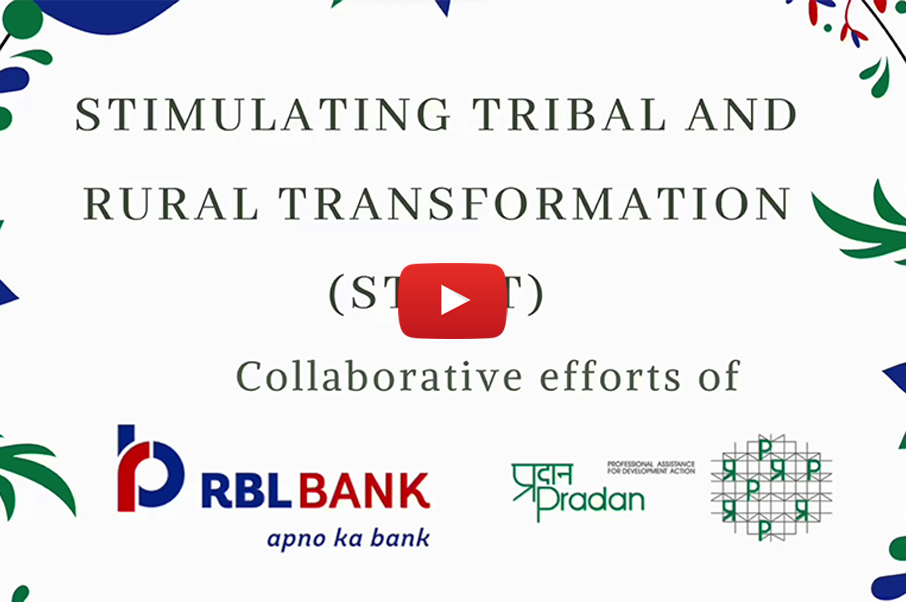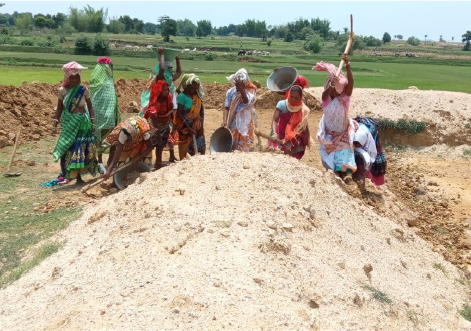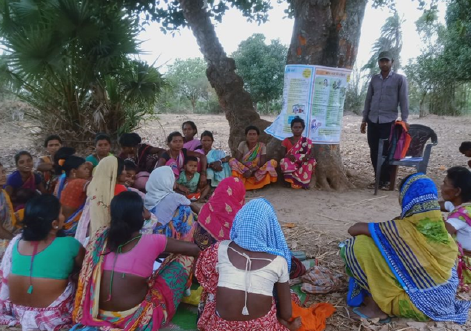Stimulating Tribal And Rural Transformation(START)

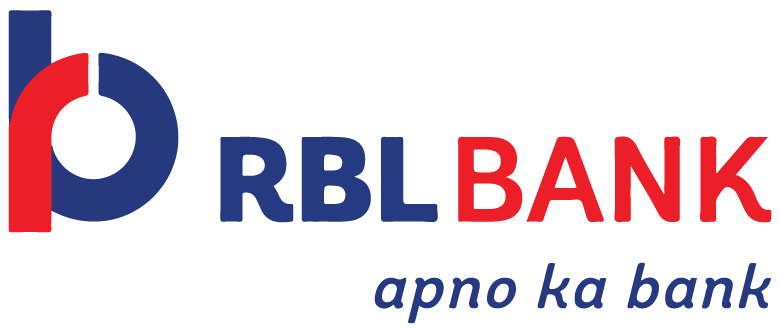


“PRADAN’s engagement with tribal communities in the central India belt runs long and deep. Initiatives like the Stimulating Tribal and Rural Transformation (START) project supported by RBL Bank Ltd. are extremely important in stimulating a transformative change in the lives of the poor and marginalized communities, through well planned catalytic investment and support that leverages government schemes and programs to improve the livelihoods and lives of the tribal communities and women collectives. We look forward to RBL Bank’s continued support beyond a good START.”
Saroj Kumar Mahapatra - Executive Director, PRADAN

“We are proud to be partnering PRADAN in triggering growth nuclei in some of the economically disadvantaged regions of Odisha, West Bengal, Jharkhand and Bihar under the START project. The project aspires to not only sustainably enhance the incomes of marginal farmers in the tribal regions through diversified livelihood options but also improve agriculture practices and irrigation facilities, and provide a voice and identity to women farmers in the region."
Balakrishnan Natarajan - Head, Corporate Social Responsibility, RBL Bank Ltd
“TargetLorem ipsum dolor sit amet, consectetuer adipiscing elit, sed diam nonummy nibh euismod tincidunt ut laoreet dolore magna aliquam erat volutpat. Ut wisi enim ad minim veniam, quis nostrud exerci tation ullamcorper suscipit lobortis nisl ut aliquip ex ea commodo consequat. Duis autem vel eum iriure dolor in hendrerit in vulputate velit esse molestie consequat, ”
— Name, Designation, Company
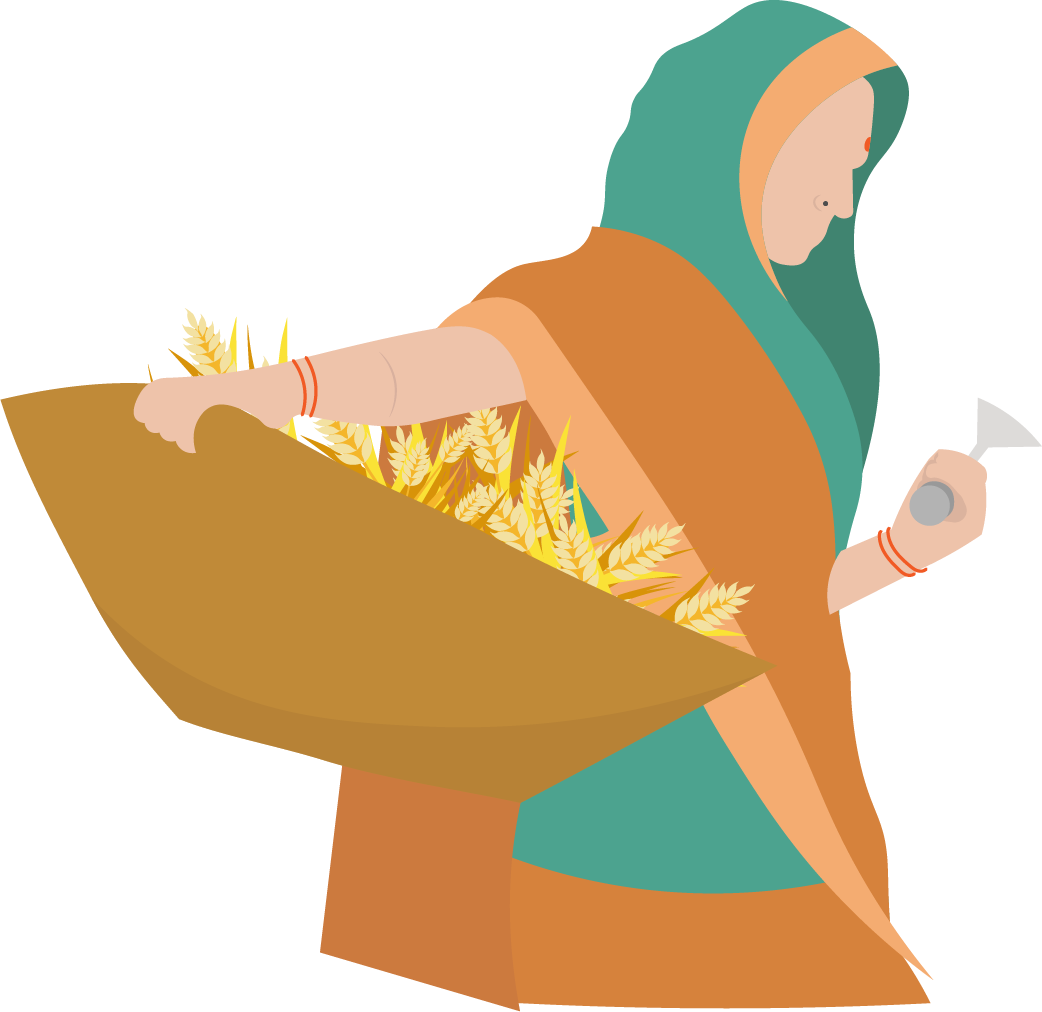

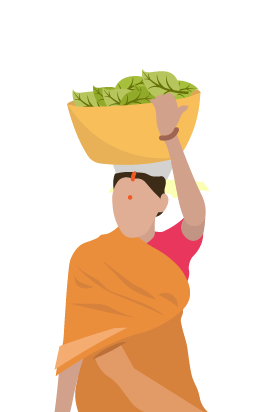

RBL Bank Limited and PRADAN are partnering a three-year project called START (Stimulating Tribal and Rural Transformation) to create growth clusters in four districts of Kalahandi, Bankura, Banka, and West Singhbhum in the Eastern Indian states of Odisha, West Bengal, Bihar, and Jharkhand respectively.
The project would develop regionally suitable women centric socio-technical-institutional models for agriculture development and farm allied activities. The emphasis will be on supporting women gain knowledge and skills to ensure household food and nutritional security so that no one goes hungry.
START aspires to reach out to a total of 25,000 women from as many households, a majority of whom would belong to socio-economically weaker sections. 70% of the target communities would be from the Schedule Tribe (ST) and Schedule Caste (SC) communities and the remaining would be from the Other Backward Class (OBC) communities. A majority would be small and marginal farmers and a small section would also be landless families. By the end of three years the project interventions would cover 400 villages.
The major strands of interventions for the project are:
- Mobilizing rural women collectives, ensuring food security, and strengthening livelihood activities
- Rural economy revival through Mahatma Gandhi National Rural Employment Guarantee Scheme (MGNREGS)
- Reviving the farm-sector through promotion of Farmer Producer Organizations(FPOs)
- Micro-enterprise promotion (Sal-Leaf Plates & Tamarind)
- Diversifying livelihood basket of small and marginal farmers (Goat/Poultry)
- Promotion of Self-Employment
START project aims to set-up four women managed and owned FPOs, one in each district, through provisioning of working capital of around INR 11 lakhs to each FPO as grant support from the project. Value-chain and market studies conducted around two commodities - Sal Leaf and Tamarind - would help to shape the business development of the micro-enterprises being set-up under the project. Apart from this, the project will promote and support 100 Goat/Poultry Users Groups formed at the village level, supporting 4,000 families.
The project will help mobilize INR 900 lakhs over three-years, through convergence of government programs and schemes. With the aim to improve agricultural practices, it will bring around 7,500 acres under improved and modern agriculture practices. Along with this, a total of 200 youth will be promoted as entrepreneurs to support the various livelihood activities planned under the project.
Videos
Photos
1) Coming together is a BEGINNING Staying together is PROGRESS Working together is SUCCESS:
2) Muniya’s Good START :
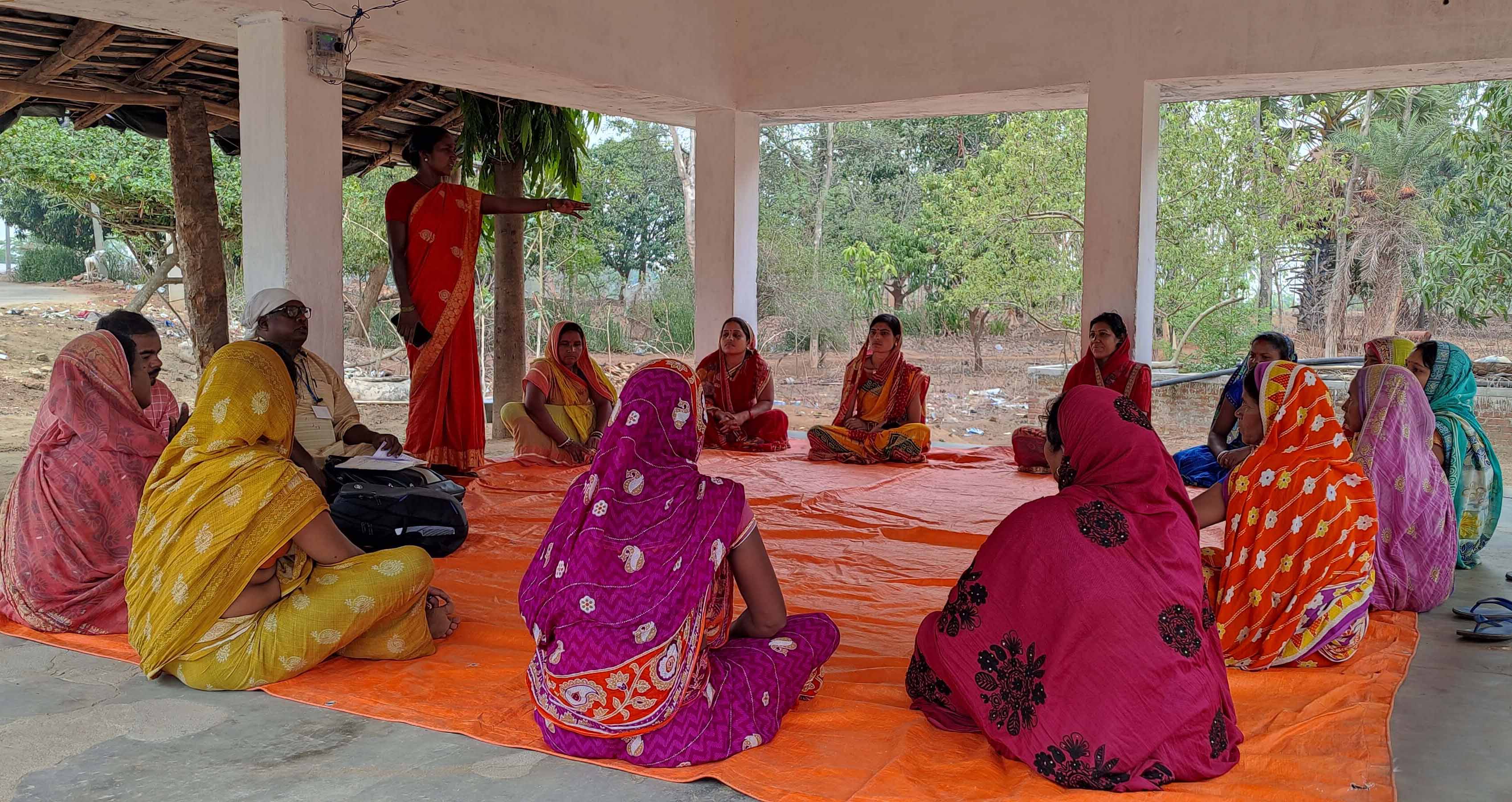
Muniya Murmu addressing a group of farmers in a meeting
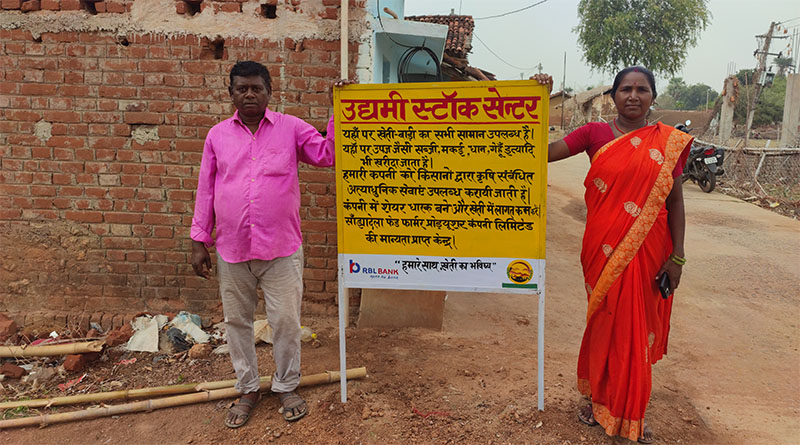
Ramesh and Muniya in front of a sign-board of their stock-centre
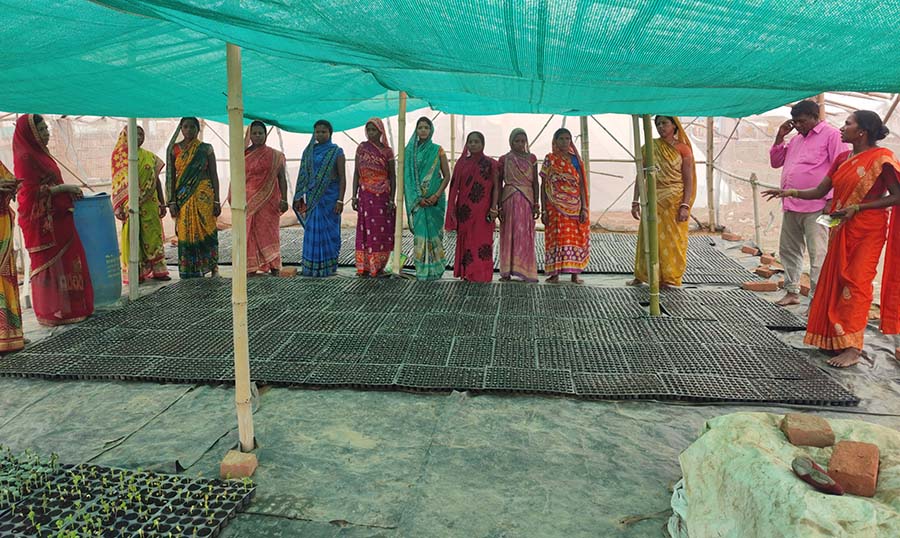
Muniya explaining how saplings are grown in her nursery to other farmers
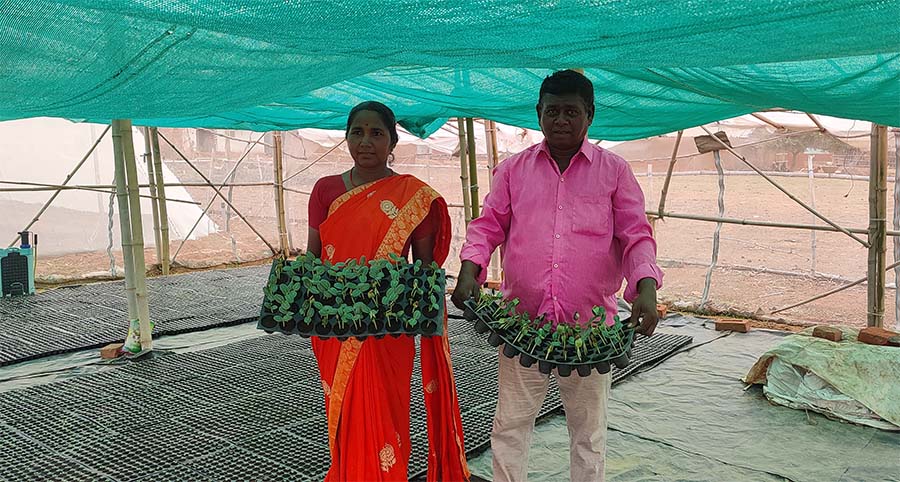
Muniya and Ramesh showing saplings that germinated in their nursery
3) Work from Home? Business from Home!:
Work from Home? Business from Home!
Shiva Prasad Nemmadi, Ranibandh
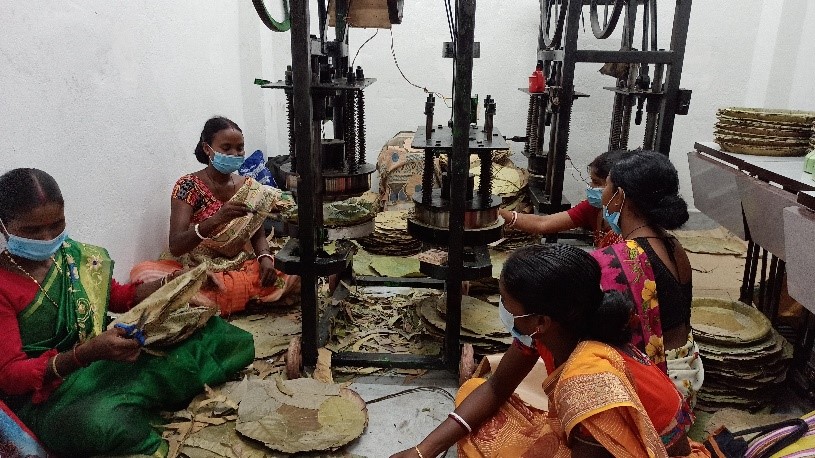 Community members working to make Sal-leaf plates
Community members working to make Sal-leaf plates
Closeness to Forest
Santhals have remained inseparably associated with forests for centuries. Lives, livelihoods, customs, and rituals for this tribal group called Santhals have always been tied to the dense sal and tendu forests of eastern part of India. Bahamuni Hembram, of Khata-am village grew up amidst one such deep forested areas of West Bengal. But, the more they have remained close to the nature and the forests, their distance with income prospects have widened. So, what does that mean? They have led their lives by collecting dry leaves, mahua, honey, dry timbers, which have never brought much cash income from the markets. Growing food has always meant seasonal agriculture, producing just enough that the community can eat – for about six months a year. Any remunerative livelihood option that would promise a year-round steady in-hand cash flow from the market remained unknown to the Bahamunis of Ranibandh block, situated in the north-western part of West Bengal, which is a part of the Bankura district and is predominantly inhabited by Santhal people.
“Jongol thike ja pai, amader tai diyei din choley. Sal pata kudai,kono shomoy tai diye plate banai ar bajare bechi, phoshol ar kii ba hoy emon? Oi kono mowte din kate go…” (we survive on whatever these forests offer us. We collect sal leaves, at times make leaf plates and sell them, we don’t grow a lot of crops. Just somehow manage to survive), mentioned Bahamuni.
Forest Provides Leaves
The market intermediaries, who used to help them market their leaves or the plates were their only ray of hope for earning money. But, what does one do when people promising to bring income to you control the entire business, and could disrupt the only source of income you have? Well, this is exactly what was happening with the villagers of Ranibandh.
“Amra konodino bajar dekhini, she jayga je Kemon taii to jani na, tate sal pata je koto daam-e bikoy tao janina. Oi dadara ja bolto tai mene nitam” (we have never seen the markets, we don’t know how the places look like or what happens there – what’s the price of these leaves or plates there. We had to believe what those market-intermediaries told us) shares Bahamuni. There was no formal contract with these intermediaries, nor did they ever provide any clarity on the prevalent market rates. The peak time for collection of leaves is the three months of Poush-Magh-Phalgun (mid-December to mid-March) and this was the only time when the market-intermediaries visited the villages, leaving the villagers absolutely clueless and vulnerable for the rest of the year.
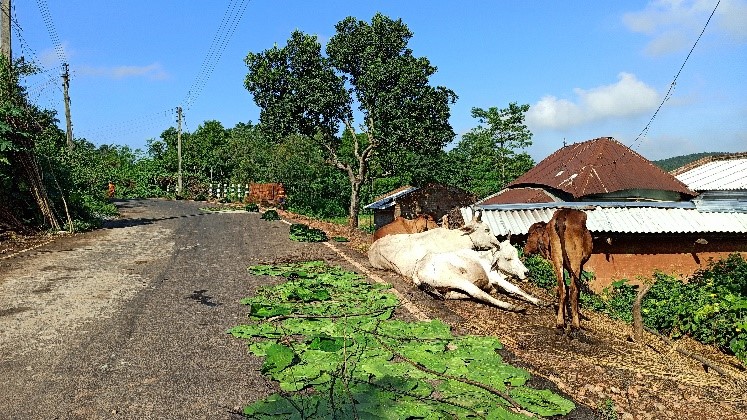 Sal-leaves drying on road
Sal-leaves drying on road
On the other hand, upon being asked about the reasons for quoting such less and uncertain prices for the sal-leaf plates, the intermediaries would say that the plates produced by the villagers were stitched with twigs and were not uniform in shape and so the plates failed to compete with the plates firmly stitched with threads and finely crafted with machines.
“Amra jongoler manush, ei sal pata beche shom mile hajar teen-ek taka pai, ta diye chhele-meyegulor mukhe kahabar debo – naki silai machine kine aro bhalo plate banabo, bolo dekhi?” (We are born and brought up inside forests. The sal leaves we sell get us very meagre amounts of Rs. 3,000-4000 a year. Should we keep that money to buy food for children or spend it on sewing machines?) Bahamuni would murmur. The villagers were stuck in a vicious loop of inferior quality, exploitation, lack of forward or backward linkages.
The wheel ‘START’ed turning, for good
PRADAN staff of the local team in Khatra of Bankutra district, who were witnessing this problem, identified this as an important issue to address. It was essential to bring systematic changes in the business model and to formalise it as an industry. The START (Stimulating Tribal and Rural Transformation) project supported by the RBL Bank Ltd. helped the communities to do that. A plan to set-up a micro enterprise of forest producers to improve their livelihoods was formulated. However, the project itself came with a lot of challenges.
One of the major struggles while introducing the project in the villages of Ranibandh was that the primary producers thought it was another market intermediary coming into play. And they couldn’t be blamed. Years of harassment bred enough distrust!
So, the process of convincing the villagers was a long and tedious one. They were met every day, listened to, and encouraged to take care of the entire business by themselves while the project remained a strong pillar of support.
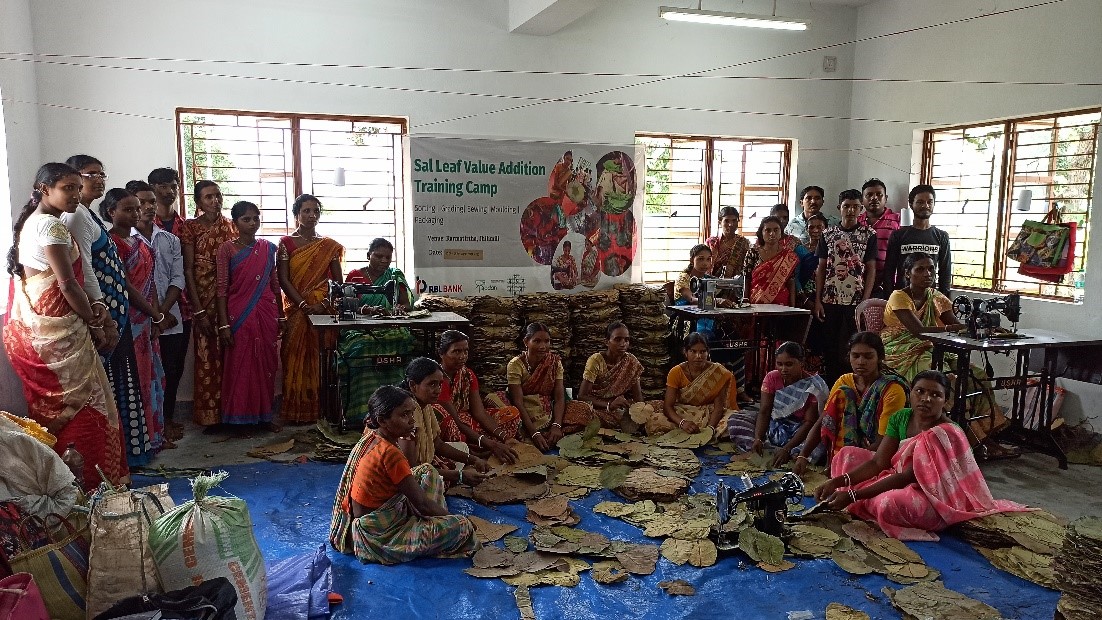 Sal Leaf Value Addition Training Camp
Sal Leaf Value Addition Training Camp
Trust was built slowly, and the process of setting up a formal institution for the enterprise was initiated. The project aimed at creating an ecosystem for the villagers where they could sell their leaves throughout the year at a fixed rate decided by the formal structures like the FPOs (Farmer Producer Companies) and PGs (Producer Groups). A few PGs namely, Chatnigora Bidu Chandana Utpadankari Samity, Majgeria Maa Laxmi Utpadonkari Samity, were formed connecting them with the Ranibandh Mahila Farmer Producer Company Limited (the FPO) to formalise the structure, secure the process, and maintain a fixed rate for the plates. The villagers, especially women, were trained to collect, stitch, and mould the sal leaves.
Coming Together, Achieving Together
The formalisation of the entire process assured the villagers of selling of their products throughout the year. The PGs and FPO identified aggregators and stitchers in the village, provided them with training and machines and also bought the end product from them at a fixed rate selling them in the market making the process fair to everyone. The problem of isolation or the lack of knowledge was solved. Everybody was being paid the same, at a fair price!
Stitching and moulding of plates have become major income-generating means for the women. Their income has increased to almost Rs. 5,000- Rs. 6,000 for every 100,000 plates which is a leap of Rs. 2,000 on an average, to begin with. And it’s not just an increase in cash income, but a greater boost to their morale and identity as successful individuals in their hamlets. Bahamuni and other producers of these villages feel more confident about their work now and the practice of working in a group to create a ‘value-added product’ is strengthening their sense of community and ownership.
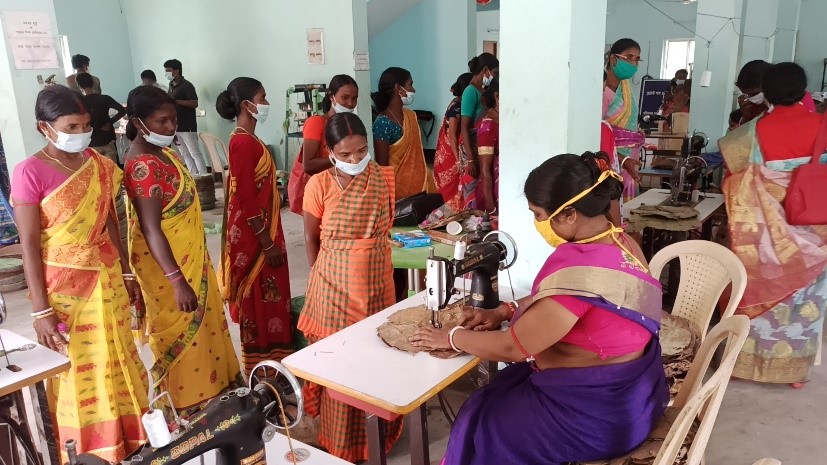 Community members involved in stitching of sal-leaves
Community members involved in stitching of sal-leaves
The Future Awaits
“Sal pata theke rojgarer ekta notun rasta khule gechhe amader jonyo! Ghore boshey plate banai, ghore boshey bechi, ar shudhu bhabo – shobbai ek taka rojgar kori!”(The formalised structure of sal-leaves collection has opened a new source of income for us. We work from home, we sell the product from home, and everyone earns the same amount of money making the process fair to everyone), chirps Bahamuni.
Today, the tribal women of Ranibandh are forming and strengthening their PGs & FPOs as well as leading and taking the ownership of their business. The aim of these women is to further create a more sustainable B2B (Business to Business) model and connect with a larger market for improved business and earnings.
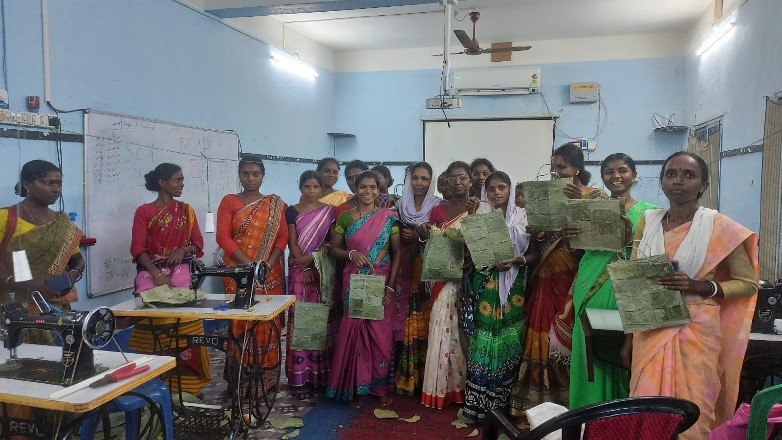 Community members with a Sal-leaf product
Community members with a Sal-leaf product




